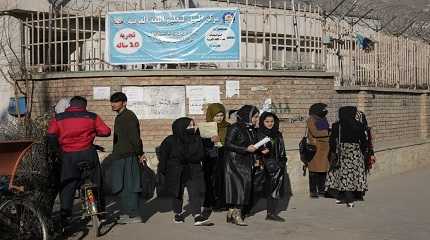
KABUL, Afghanistan (AP) — Major aid agencies on Thursday warned that Afghans will die because of the Taliban order banning women from working at nongovernmental groups, and stressed that female staff are crucial for the delivery of life-saving humanitarian assistance across war-battered Afghanistan.
The dire prediction came after the Economy Ministry last week said women can no longer work at international or domestic NGOs, allegedly because they are not wearing the Islamic headscarf, or hijab, correctly at their workplace.
The order was the latest blow to women’s rights and freedoms since the Taliban took power in August 2021. The move has triggered international condemnation and calls for the Taliban to reverse their decision immediately, as the country grapples with a spiraling humanitarian crisis, a harsh winter, and an economic collapse.
Save the Children, Care, World Vision and the Norwegian Refugee Council have suspended their operations in Afghanistan. They held a joint press briefing on Thursday.
“If we’re not able to start our programming, children will die. Hundreds and thousands of people will die, that’s how serious the situation is,” said Inger Ashing, the CEO of Save the Children International.
“If we’re not able to be there for Afghan people, we will lose them. They will die,” she said.
The four agencies also said at the briefing that Afghanistan is grappling with one of the worst hunger crises on record, with 6 million people on the brink of famine.
Despite initially promising a more moderate rule respecting rights for women and minorities, the Taliban have widely implemented their interpretation of Islamic law, or Sharia, since their takeover of the country.
They have banned girls from middle school, high school and university, barred women from most fields of employment and ordered them to wear head-to-toe clothing in public. Women are also banned from parks and gyms. The Afghan society, while largely traditional, had increasingly embraced the education of girls and women over the past two decades under a U.S.-backed government.
On Wednesday, the United Nations said some of its “time-critical” programs have stopped temporarily in Afghanistan due to lack of female staff. The U.N. stressed that its female staff are key to the humanitarian response in the country, accessing a population men cannot and safeguarding the communities being served.
“Banning women from humanitarian work has immediate life-threatening consequences for all Afghans,” the U.N. warned in its statement.
“This comes at a time when more than 28 million people in Afghanistan, including millions of women and children, require assistance to survive as the country grapples with the risk of famine conditions, economic decline, entrenched poverty and a brutal winter,” the U.N. added.
The NGO ban came days after the ban on female higher education, triggering international condemnation and and an outcry at home.
A minister for higher education in the Taliban government, Nida Mohammad Nadim, has defended the ban, saying it is necessary to prevent the mixing of genders in universities and because, according to him, some subjects violate Islamic and Afghan values.
A spokesman for the private universities’ union, Mohammad Karim Nasiri, said Thursday that 35 institutions risk closure because of the ban. Male students have also been boycotting classes and exams in solidarity with their female counterparts, he added.
Afghanistan has 140 private universities across 24 provinces with around a total of 200,000 students. Out of those, some 60,000-70,000 are women. The universities employ about 25,000 people.
“Closing the universities (to women) is both a spiritual and material blow,” Nasiri said. “We boldly told authorities that, with this decision, the nation is going backward and everyone is worried.”
“It is not a good situation, everyone is worried about this decision — whether they are teachers, students, or administrative staff,” he added.
Because of all the financial losses, private university owners told a senior Taliban official, Maulvi Abdul Kabir, and the union that they will have no choice but to close the schools and move their investments abroad if the decision is not reversed, Nasiri said.
He did not indicate a timeframe for the closures. Most universities are currently on a winter break.
The Higher Education Ministry was not immediately available for comment.




